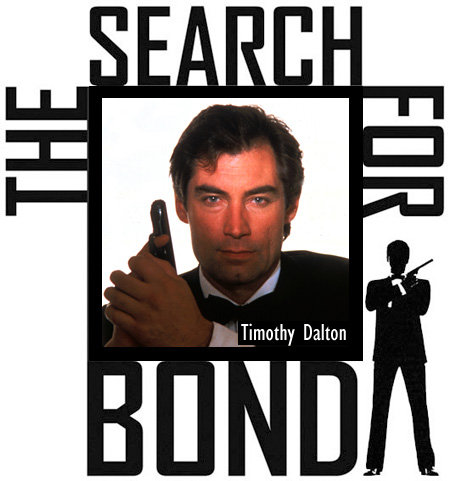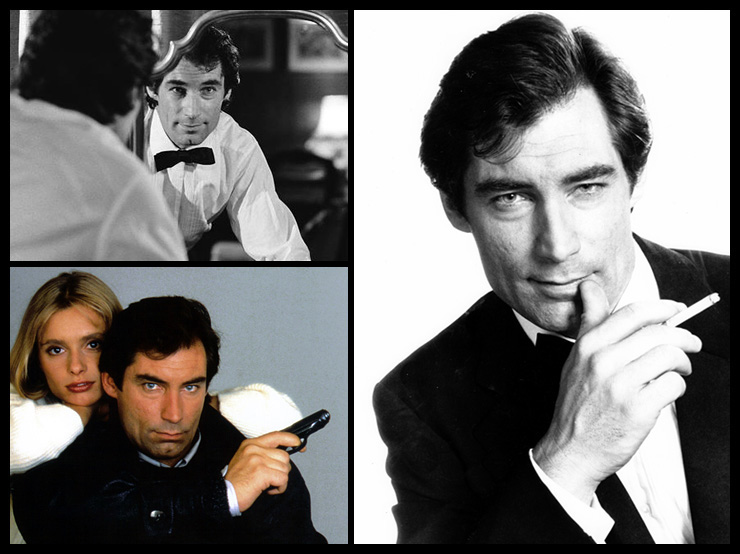 |
|
ABOVE: (top left)
Timothy Dalton's screen test in 1986 convinced the producers
that he was the right man to become Bond #4. (right & bottom
left) Publicity photos returned to the style of the Connery
movies and portrayed Bond as a cigarette smoker for the first time in many
years. |
|
|
|
Dalton's Bond debut
The Living Daylights was a big hit and his performance highly praised.
Confident that Dalton was the man to lead Bond into the 90s work began on
his follow up. While Daylights had been to some extent a compromise movie,
with much of the script written prior to Dalton’s casting, Licence To
Kill was totally constructed around his portrayal and pushed the
character in the direction the actor wanted, more in keeping with the
spirit of Fleming’s original concept of an agent relying mostly on his
wits. “We’ve got the film back in the world James Bond should inhabit,”
Dalton said. “We’ve left the tongue in cheek humour and caricature
behind.” |
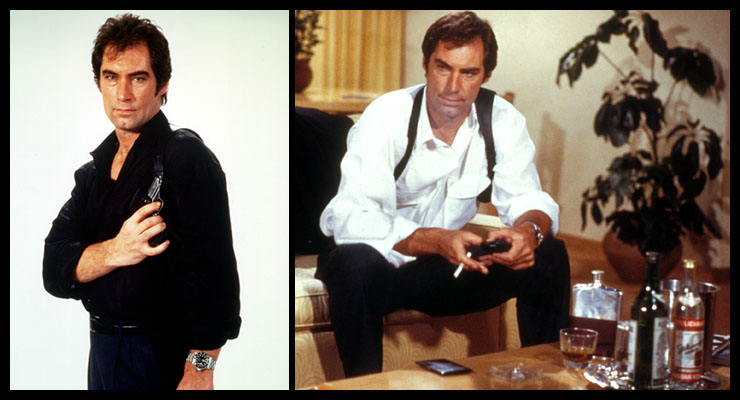 |
|
ABOVE: Although far from a box-office disaster on
its original release, Licence To Kill failed to find an
audience that was then ready for a return to Ian Fleming's
literary roots with Bond as a hard-drinking, hard-smoking
womaniser. |
|
|
|
Sadly the experiment
failed and Licence To Kill performed badly in the crucial American
market, selling only half the tickets sold for Octopussy. It didn’t
help that big hitters like Indiana Jones, Lethal Weapon 2 and
Batman were at the same time competing for cinemagoer’s hard-earned
dollars. But even in Europe the film proved a disappointment. Dalton’s
desire to take the Bond character back to its roots was certainly
applauded by die hard 007 fans and the production team, but it never
really clicked with the mass audience.
Over the next few years legal issues kept
Bond off the big screen. But what the public really wanted to know was –
when a new Bond movie finally appears would it be starring Timothy Dalton.
Rumours abounded. In one report Michael Caton-Jones, who had come to
prominence with Scandal (1989) and Memphis Belle (1990), was
said to have been approached to direct ‘The Property of a Lady’, named after
an Ian Fleming short story that might possibly have starred either Anthony
Hopkins or Whoopi Goldberg as the main villain. Locations included Japan
and Hong Kong and the story, involving international nuclear terrorism,
would have featured far more fantastical elements than Dalton’s two
previous 007 assignments.
In April 1994 Timothy Dalton was filming the
CBS mini-series Scarlett, playing another iconic literary figure,
Rhett Butler, when he was sent the script for BOND 17. Because of the box
office performance of Licence To Kill Dalton knew there were some
executives at MGM who wanted to see the back of him. All the time, though,
he took solace in the fact that he had the personal backing of Broccoli
and Michael G. Wilson. Still, he decided that the time was now right to
step down as Bond. “It has been six years since the last James Bond film,”
ran his press statement. “And eight years of worldwide identification with
the 007 image. As an actor I believe it is now time to leave that
wonderful image behind and accept the challenge of new ones. The Broccoli's
have been good to me as producers. They have been more special as
friends.” |
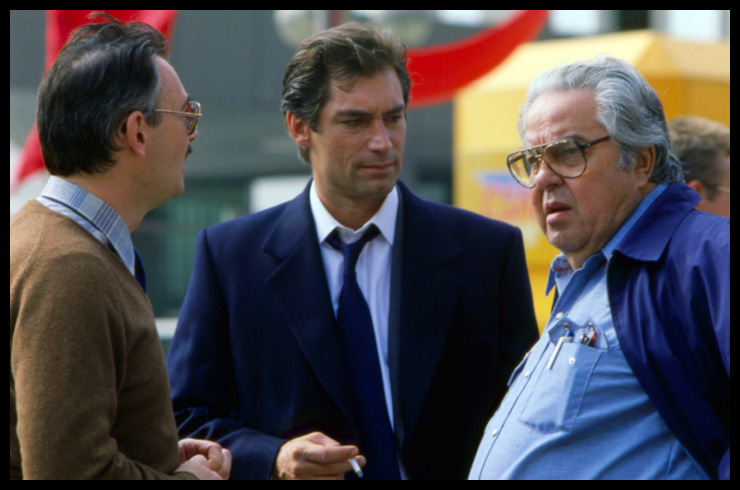 |
|
ABOVE: Timothy
Dalton with Michael G. Wilson and Albert R. Broccoli on location
in Vienna during the shooting of The Living Daylights
(1987). Even after his departure as James Bond, Dalton remained
friends with ‘Cubby’ Broccoli and his family, and was one of the
pallbearers at the Bond producers’ funeral in 1996. |
|
|
|
EON opted not to stand in
Dalton’s way and released their own press statement. “We regret Timothy’s
decision. We have never thought of anyone but Timothy as the star of the
17th James Bond film. We understand his reasons and will honour his
decision.”
The various treatments
and scripts developed for Dalton’s third outing were now all scrapped and
screenwriter Michael France settled down to write what ultimately became
GoldenEye. Later, France revealed that he believed Dalton had been
made the scapegoat for the recent failure of the Bond films at the box
office. “Michael Wilson and Barbara Broccoli both thought he was a great
Bond, and so did I.” |
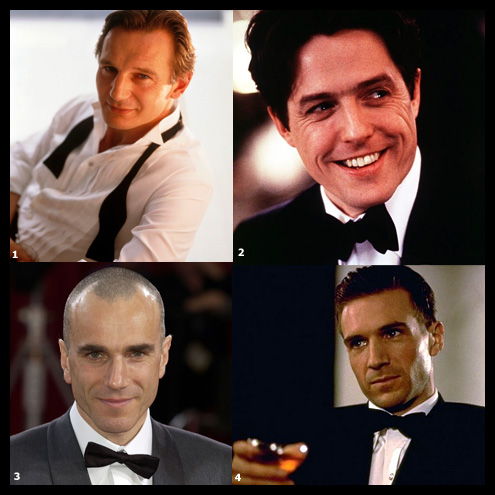 |
|
1. Liam Neeson 2.
Hugh Grant 3. Daniel Day-Lewis 4. Ralph Fiennes. |
|
|
|
When Dalton stepped down
as 007 (or was he pushed) the press launched into a frenzy of speculation
as to his replacement: Mel Gibson, Liam Neeson, Hugh Grant, Daniel Day
Lewis and Ralph Fiennes were all mentioned. Film critic Gene Siskel
proposed Denzel Washington. But as far as the bulk of the press and public
were concerned there was only one candidate, and Pierce Brosnan knew it.
He was bracing himself for the mass speculation around his name. “When the
subject came up I just said to my agent, Look, I want this resolved as
quickly as possible. I don’t want to be part of a media circus. I don’t
want a long, protracted flirtation – either use me or not, but let’s not
fuck around.” Fuck around was pretty much what the producers did, though
only a little. In order to make certain Brosnan was the best choice
Barbara Broccoli and Michael G. Wilson conducted a brief search of unknown
actors across the globe. “We didn’t offer it to anyone else although we
did look for several months at a lot of different people,” Wilson
admitted. “Pierce we considered 10 years before, and the question was who
else had come along in the meantime that we could consider.” |
|
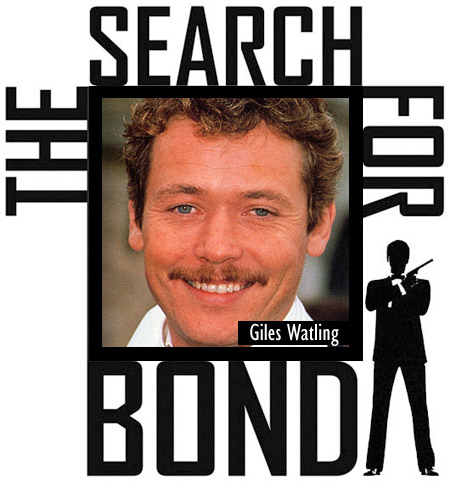 |
|
One of those actors was
Giles Watling. Primarily a theatre actor, Watling was best known for
appearances in a number of television sitcoms, notably as the cringing
Oswald the vicar in Carla Lane’s Bread. When that comedy finished
in 1991 Watling found himself with little work, but a young family and a
big house to run. Cash was in short supply. “Then around 11.30 one evening
the phone rang,” recalls Watling. “The voice on the other end apologised
for the lateness of the call but he felt that time was of the essence. He
said he’d seen me in a production of Jamaica Inn at the Lyric
Theatre, Hammersmith recently where I had been playing the rough-tough Jem
Merlin. He said he thought my performance was very good. Now at this point
I thought I’d got some kind of fan or crank on the line as he hadn’t as
yet given me his name. Thank God I didn’t go into patronising mode –
instead I asked politely who this was. ‘Lewis Gilbert,’ he said.”
Of course Watling knew of
Gilbert’s cinematic pedigree, directing such classics as Alfie and
Educating Rita. “He asked if I was working. No actor likes to admit
that he hasn’t heard a peep out of his agent in ages. ‘Bits and pieces –
nothing grand,’ I lied. Then he said, ‘Would you mind if I put your name
in the hat for Bond?’ I had no idea what he was on about and foolishly
asked him to expand. He told me that he had discovered that Timothy
Dalton’s run as James Bond was coming to a slightly premature end and that
EON Productions were casting about for the next man in line. That could
well be me. At this point I recalled that Lewis had directed no less than
three Bond pictures. My knees went weak. Would I mind? Would I like to
think about it? Would I Hell! ‘Thanks for thinking of me,’ I said – or
words to that effect. Lewis told me he would have a word with Cubby in the
morning. Sadly Cubby was ill.”
Watling experienced an
odd combination of numbness and exhilaration; and also a bit of déjà vu.
Back in the late 80s he was down to the last two for the part of ‘The
Saint’ in a new series of films featuring Leslie Charteris’ hero. He did
the screen test, quite well he thought, but the role made famous by Roger
Moore and Ian Ogilvy finally went to Simon Dutton and the series failed
spectacularly. “The rest of this little episode in my life is something of
an anticlimax,” admits Watling. “I mean you would have noticed if I’d
actually got the Bond job, so it goes without saying that it went to
someone else. Over the next couple of months there were a few more little
frissons of excitement. My agent was approached by Debbie McWilliams, who
still is, I believe, the EON casting director, saying that Barbara
Broccoli would like to see me. My agent was starting to mention money;
undreamed of sums. Then someone at EON called me and said that they really
wanted to cast Pierce Brosnan as Bond. If they couldn’t get him they would
give me a call. They never did. Perhaps ‘The Saint’ might not have been a
bad thing after all.”
Watling is good humoured
about his 007 close encounter and remains somewhat bemused as to what
exactly Lewis Gilbert saw in him. “I guess it was the fact that the role I
played in Jamaica Inn was a bit of a rogue, charming with a cruel
streak. In addition - even if I do say it myself - I was quite fit at the
time, tanned and spent a part of the play wandering around half naked.
Bond perhaps? I don’t know. I did do quite some work on how to approach
Bond during the time it was a possibility. I worked out and re-read a
couple of the books for a start. Bearing in mind Dalton’s earthy,
realistic, slightly humourless approach I felt that it might be good to
reintroduce some of the fun. After all Bond is a fantasy figure - we have
to suspend disbelief. Why not push the boundaries a little; having said
all that I really believe that Brosnan was a great Bond.” |
|

